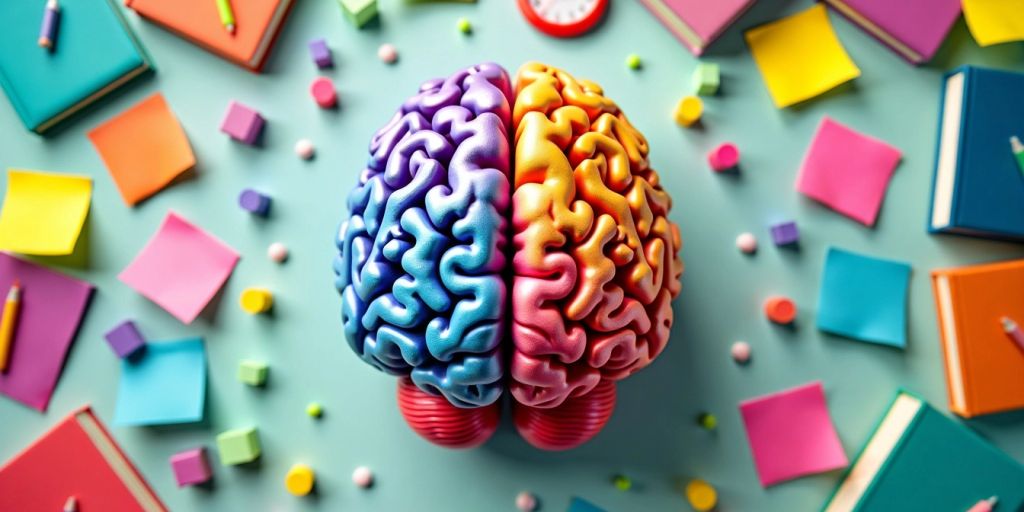Improving memory is essential for students, professionals, and anyone looking to enhance their cognitive skills. Here are seven quick tips that can help you boost your memory and retain information more effectively. These strategies are simple and can be easily incorporated into your daily routine.
Key Takeaways
- Create a ‘Mind Palace’ to visualize and store memories.
- Ensure you get enough sleep to keep your mind sharp.
- Regular exercise can enhance brain function and memory.
- Use mnemonics to simplify and remember information.
- Chunk information into smaller parts for easier recall.
1. Mind Palace
The Mind Palace technique is a powerful way to boost your memory. This method, made famous by the Sherlock TV show, involves creating a mental space where you can store information. Here’s how to use it effectively:
- Choose a familiar place: Think of a location you know well, like your home or school.
- Visualize the space: Imagine walking through this place and identify specific spots to store different pieces of information.
- Place items in your palace: As you learn new things, visualize placing them in these spots. For example, you might put a new vocabulary word in your living room.
Using this technique can help you remember things more easily.
A mind palace is also known as a “memory palace.” It’s a technique that has been used for centuries to enhance memory skills.
By practicing this method, you can improve your ability to recall information when you need it. Remember, the more vivid and detailed your palace, the better your memory will be!
2. Sleep

Getting enough sleep is essential for a sharp memory. A better night’s sleep can boost your memory! Most adults need between 7.5 to 9 hours of sleep each night to function well. Here are some tips to improve your sleep:
- Stick to a Schedule: Go to bed and wake up at the same time every day, even on weekends.
- Limit Screen Time: Avoid screens for at least an hour before bed to help your body produce melatonin, a hormone that helps you sleep.
- Watch Your Caffeine: Cut back on caffeine, especially in the afternoon and evening, as it can keep you awake at night.
| Sleep Tips | Benefits |
|---|---|
| Regular sleep schedule | Improves sleep quality |
| No screens before bed | Helps melatonin production |
| Reduced caffeine intake | Promotes better sleep |
Sleep is not just about resting; it plays a crucial role in how well we learn and remember things. Without enough sleep, our brains struggle to process and store information effectively.
By following these tips, you can enhance your sleep quality and, in turn, improve your memory.
3. Exercise

Why Exercise Matters
Exercise can boost your memory and thinking skills. When you get your body moving, it helps your brain work better. This happens because exercise increases blood flow to the brain, which is essential for good mental function.
Benefits of Physical Activity
Here are some key benefits of regular exercise for your brain:
- Improves mood: Exercise releases chemicals that make you feel happier.
- Enhances sleep: A good workout can help you sleep better at night.
- Reduces stress: Physical activity lowers stress and anxiety levels, which can improve memory.
Types of Exercises to Try
To get the most brain benefits, consider these types of exercises:
- Aerobic activities: Running, swimming, or cycling are great for getting your heart pumping.
- Strength training: Lifting weights can also help improve brain health.
- Coordination exercises: Activities like dancing or playing sports can boost brain function.
Quick Tips for Staying Active
- Make it fun: Choose activities you enjoy to stay motivated.
- Set a schedule: Try to exercise at the same time each day to build a habit.
- Start small: Even short bursts of activity can help your brain.
Regular exercise is not just good for your body; it’s essential for your mind too!
4. Mnemonics
Mnemonics are clever tools that help us remember information more easily. They can turn complex data into simple, memorable forms. Here are some popular types of mnemonics:
- Visual Images: Create a vivid picture in your mind. For example, to remember the name "Rosa Parks," imagine a woman sitting on a park bench surrounded by roses.
- Acronyms: Form a new word using the first letters of a list. For instance, "HOMES" helps recall the Great Lakes: Huron, Ontario, Michigan, Erie, and Superior.
- Rhymes: Use catchy phrases or rhymes to remember facts. An example is, "Thirty days hath September, April, June, and November" to recall the months with 30 days.
Benefits of Using Mnemonics
- Enhances recall: Makes it easier to remember information.
- Saves time: Quickens the learning process.
- Fun and engaging: Turns studying into a more enjoyable activity.
Mnemonics can be a game-changer in how we learn and remember. They allow us to connect new information with what we already know, making it easier to recall later.
By using these techniques, you can improve your memory and make learning more effective!
5. Chunking
Chunking is a powerful technique that helps improve memory by breaking down large amounts of information into smaller, manageable pieces. This method makes it easier to remember complex data. For example, instead of trying to memorize a long string of numbers, you can group them into smaller sections, like a phone number (e.g., 555-637-8299 instead of 5556378299).
How Chunking Works
- Organize Information: Start by outlining what you need to remember. This helps you focus on key concepts.
- Create Logical Groups: Divide information into categories. For instance, when learning a new language, group vocabulary by themes like food, animals, or places.
- Use Familiar Patterns: Relate new information to something you already know. This makes it easier to recall later.
Benefits of Chunking
- Reduces Cognitive Load: By simplifying information, your brain can process it more efficiently.
- Enhances Recall: Chunking helps create stronger memory connections, making it easier to retrieve information when needed.
- Improves Learning: This technique is especially useful for students, as it aids in mastering complex subjects.
Chunking is not just about memorizing; it’s about understanding and organizing information in a way that makes sense to you.
By using chunking, you can transform overwhelming information into bite-sized pieces that are easier to digest and remember!
6. Visualization
Visualization is a powerful tool for improving memory. By creating mental images, you can make information more memorable. Here are some effective strategies:
- Organize Information: Start by outlining what you need to remember. This helps you focus on key ideas. For example, when learning a new language, group vocabulary into categories like animals or food.
- Make Associations: Connect new information to what you already know. For instance, if you meet someone named Baker, picture them as a baker in a chef’s hat. This makes it easier to recall their name later.
- Use Visual Cues: Tools like charts, graphs, and images can simplify complex information. Visual learners often find it easier to remember things they can see. For example, using a chart to show data can help you understand and remember it better.
Visualizing information can significantly boost your memory and understanding.
Benefits of Visualization
| Benefit | Description |
|---|---|
| Enhances Recall | Helps you remember details more easily. |
| Boosts Understanding | Makes complex ideas simpler to grasp. |
| Engages Creativity | Encourages imaginative thinking and connections. |
By using these techniques, you can improve your memory and make learning more enjoyable!
7. Attention
Focus on What Matters
To improve your memory, paying close attention to what you want to remember is crucial. When you concentrate on a topic or event, it helps your brain form long-term memories. Here are some tips to enhance your focus:
- Limit distractions: Find a quiet place to study or work.
- Set specific goals: Decide what you want to remember before starting.
- Take breaks: Short breaks can help refresh your mind and improve concentration.
Use Techniques to Enhance Attention
You can also use certain techniques to boost your attention:
- Mindfulness: Practice being present in the moment.
- Active engagement: Ask questions or discuss the material with others.
- Visual aids: Use diagrams or charts to help you focus on key points.
Remember, shifting important facts from short-term to long-term memory takes about 8 seconds of focused attention. So, when you need to remember something, take a moment to concentrate on it fully.
Final Thoughts on Boosting Your Memory
Improving your memory doesn’t have to be hard. By using simple techniques like organizing your information, getting enough sleep, and staying active, you can make a big difference. Remember to challenge your brain with new activities and use all your senses when learning. Don’t forget to write things down and create stories to help remember important details. With these tips, you can keep your mind sharp and make learning easier. So, start today and see how much better you can remember!
Frequently Asked Questions
What is a mind palace and how does it work?
A mind palace is a memory technique where you visualize a familiar place and associate information with different areas in that space. This helps you remember things better.
Why is sleep important for memory?
Sleep helps your brain process and store information. Without enough sleep, you may forget things more easily.
How does exercise improve memory?
Regular exercise boosts blood flow to the brain, which can help improve memory and overall brain function.
What are mnemonics and how can they help?
Mnemonics are memory aids, like rhymes or acronyms, that help you remember information by making it easier to recall.
What is chunking and why is it useful?
Chunking is breaking down information into smaller parts, making it easier to remember. For example, it’s easier to remember a phone number in sections.
How can visualization help with memory?
Visualization involves creating mental images of the information you want to remember, which can make it stick in your mind better.



